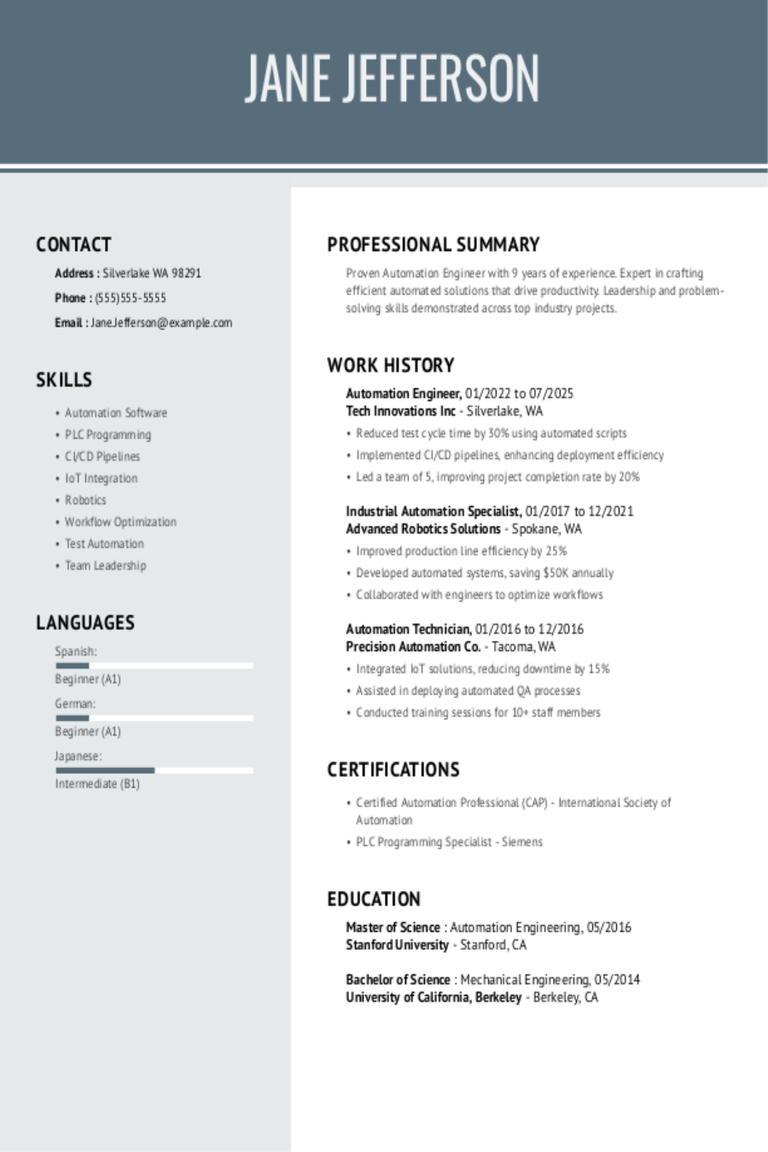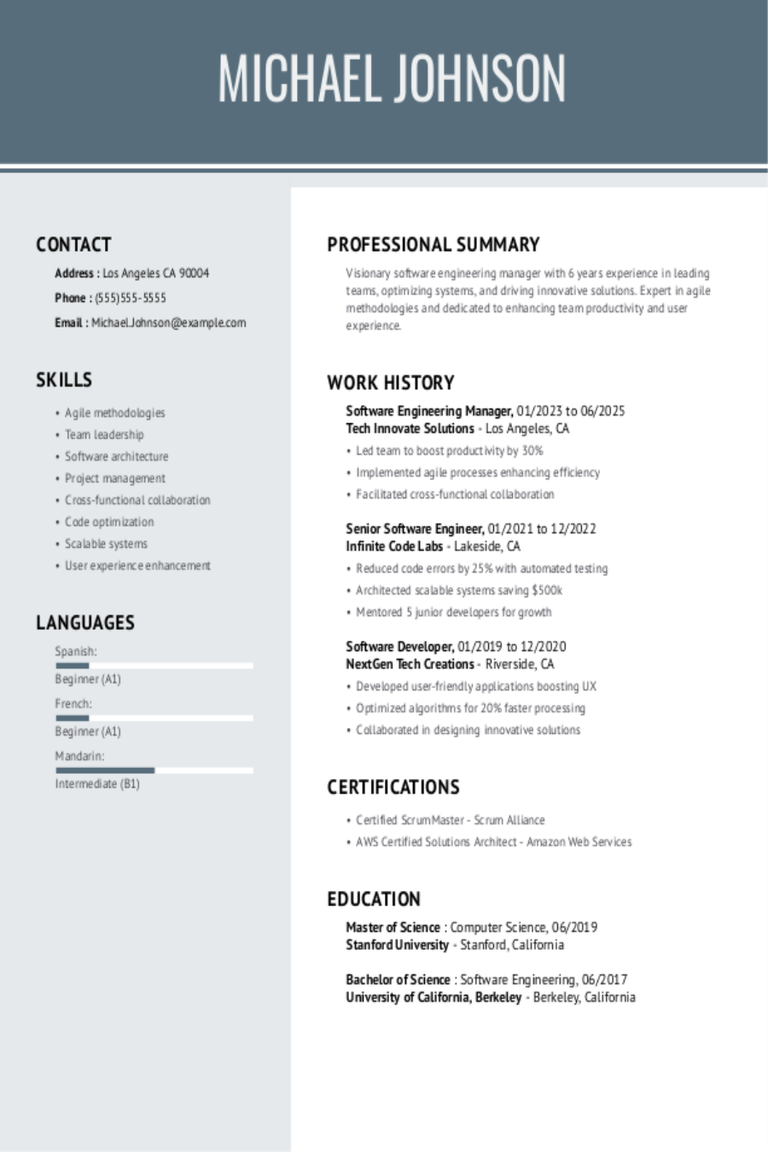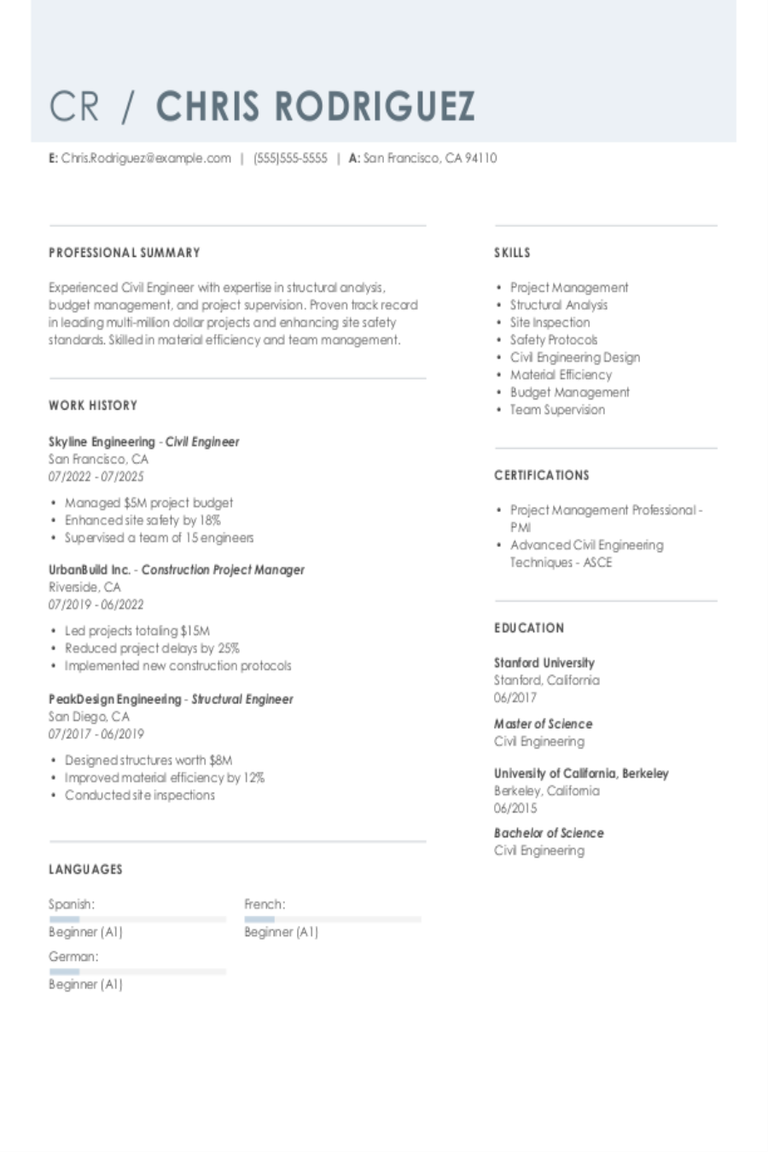Why this resume works
- Highlights industry-specific skills: Through roles like instrumentation engineer and control systems engineer, the applicant’s experience in sensor calibration and control systems design aligns perfectly with industry-specific requirements.
- Quantifies accomplishments: Referencing measurable accomplishments, such as a 15% accuracy improvement and a $200K budget management, showcases the applicant’s impact and value.
- Illustrates problem-solving ability: Spearheading projects that reduced system errors by 25% reflects strong problem-solving skills and highlights innovative solutions implemented effectively.
More Instrumentation Engineer Resume Examples
Our instrumentation engineer resume examples provide insights into showcasing your expertise in control systems, troubleshooting, and project management. Use these engineering resume samples to create a compelling resume that highlights your technical skills and relevant industry experience.
Entry-Level Instrumentation Engineer
Why this resume works
- Centers on academic background: The applicant’s education section highlights advanced degrees in instrumentation and electrical engineering, establishing a solid academic foundation and complementing early-career accomplishments like efficiency improvements and cost-saving innovations in technical roles.
- Effective use of keywords: Strategic inclusion of role-specific terms such as system optimization, network integration, and CAD design aligns with keywords for ATS compatibility while reflecting industry expertise.
- Shows digital literacy: Familiarity with platforms like CAD design and HMI configuration showcases practical computer skills essential for modern workplaces.
Mid-Level Instrumentation Engineer
Why this resume works
- Points to measurable outcomes: By showcasing quantifiable achievements like reducing equipment downtime by 25% and cutting costs by $50K, the applicant effectively communicates their impact in improving operational efficiency.
- Displays technical expertise: With expertise in process control, automation engineering, and certifications like CAP, the applicant’s technical skills are well-suited for roles demanding advanced system integration knowledge.
- Demonstrates language abilities: Language skills in Spanish, German, and French indicate the applicant’s ability to improve cross-cultural communication and supporting international projects.
Experienced Instrumentation Engineer
Why this resume works
- Focuses on work history: The applicant uses a chronological resume format to effectively showcase an impressive work history, highlighting career progression and varied experiences across key engineering roles.
- Showcases impressive accomplishments: By sharing achievements like saving $50K annually through control loop designs, the applicant highlights impactful contributions that resonate with senior-level performance.
- Lists relevant certifications: Listing certifications like Certified Automation Professional on the resume demonstrates expertise and dedication to learning, solidifying industry credibility.
Instrumentation Engineer Resume Template (Text Version)
Jane Williams
San Diego, CA 92115
(555)555-5555
Jane.Williams@example.com
Professional Summary
Dedicated instrumentation engineer with 5 years’ experience in sensor calibration and control systems design, excelling in project management and technical training.
Work History
Instrumentation Engineer
TechFlow Solutions – San Diego, CA
January 2023 – July 2025
- Implemented sensor calibration, improving accuracy by 15%
- Managed $200K budget for new instrumentation projects
- Trained 10 technicians on advanced instrumentation systems
Control Systems Engineer
Precision Instruments Inc. – San Diego, CA
January 2021 – December 2022
- Designed control systems, reducing downtime by 20%
- Integrated new sensors, boosting efficiency by 10%
- Conducted testing on 50+ control systems annually
Junior Instrumentation Technician
Innovative Automation Ltd. – San Francisco, CA
January 2020 – December 2020
- Assisted in developing instrumentation protocols
- Supported installation of 30+ instrumentation devices
- Monitored system performance, reducing errors by 10%
Languages
- Spanish – Beginner (A1)
- French – Intermediate (B1)
- German – Beginner (A1)
Skills
- PLC Programming
- Sensor Calibration
- Control Systems Design
- Data Analysis
- Project Management
- Technical Training
- System Integration
- Problem Solving
Certifications
- Certified Automation Professional (CAP) – International Society of Automation (ISA)
- Certified Control Systems Technician (CCST) – International Society of Automation (ISA)
Education
Master of Science Electrical Engineering
Stanford University Stanford, California
June 2019
Bachelor of Science Mechanical Engineering
University of California, Berkeley Berkeley, California
June 2018
Related Resume Guides
Advice for Writing Your Instrumentation Engineer Resume
Explore our expert tips on how to write a resume tailored for an instrumentation engineer position, and discover how to highlight your skills in precision, innovation, and problem-solving.
Highlight relevant technical skills
Technical skills are essential for instrumentation engineers, as they enable you to design, develop, and maintain systems that accurately measure and control industrial processes. These skills ensure that equipment operates efficiently, safely, and reliably. Including a dedicated skills section on your resume is a great way to showcase your expertise and help employers quickly understand what you bring to the table.
You can also reinforce these skills by describing how you’ve applied them in real-world projects throughout your work experience section. Instrumentation engineers typically rely on a solid understanding of control systems, sensors, transducers, and data acquisition technologies.
Proficiency in programming languages such as Python or C++ can be valuable for automation and software integration, while experience with CAD tools is useful for creating technical schematics. Demonstrating your ability to troubleshoot and repair complex systems also highlights your problem-solving capabilities.
When listing your technical skills, prioritize those most relevant to the specific role you’re pursuing. If you’ve worked with specialized equipment, platforms, or industry-standard tools mentioned in the job description, be sure to include them. Tailoring your resume in this way increases your chances of standing out by showing you’re equipped to meet the demands of the position.
Example of a technical skills section
- Process control systems (PLC, DCS)
- Instrument calibration and testing
- Control valve sizing and selection
- HMI/SCADA system design
- Industrial networking protocols (Modbus, Profibus, HART)
- Data acquisition systems (DAQ)
- Loop checking and troubleshooting
- Sensor integration and configuration
- PID tuning and optimization
- Technical documentation for instrumentation
You can use our Resume Builder to craft a resume that highlights technical skills in addition to key soft skills like teamwork, communication, and leadership.
Quantify your accomplishments
Quantifying accomplishments on your resume sets you apart by showing the impact of your work rather than just listing what you were responsible for. For an instrumentation engineer, this means highlighting measurable outcomes—like improved system efficiency, reduced downtime, or cost savings—that demonstrate your value to past employers.
Instead of saying “maintained equipment,” specify how you reduced maintenance time by a certain percentage or extended equipment lifespan through innovative techniques. Using numbers gives hiring managers a clear understanding of your contributions and helps them visualize how you can add value to their team.
In the work experience section, include key details such as job title, employer name, location, and employment dates. Then focus on turning responsibilities into achievements using action verbs and metrics.
For example, instead of “designed control systems,” say “developed control systems that improved production efficiency by 20%.” Numbers like percentages, dollar amounts saved, or hours reduced make your impact tangible and create a results-driven narrative that stands out.
By quantifying accomplishments, you help hiring managers quickly see how your skills align with their needs. This approach makes it easy for them to assess your expertise in optimizing processes or improving performance as an instrumentation engineer—making your application more compelling and memorable.
5 instrumentation engineer work history bullet points
- Implemented advanced control systems for a chemical processing plant, increasing efficiency by 25%.
- Conducted rigorous testing and calibration of instrumentation equipment, reducing downtime by 30%.
- Led a team in the installation of automated monitoring systems, improving data accuracy by 40%.
- Developed and executed preventive maintenance plans for critical machinery, decreasing service costs by 20%.
- Collaborated with cross-functional teams to design and refine process workflows, resulting in a 15% increase in output.
Exploring professional resume examples can help you visualize what works well for different jobs and experience levels, offering ideas to make your resume stand out.
Write a powerful professional summary
A professional summary on a resume serves as an introduction to hiring managers. It provides a snapshot of your qualifications, helping them decide if they should read further. When crafting your resume, you have the option to include either a summary or an objective.
A professional summary is typically three to four sentences long, showcasing your experience, skills, and achievements. This section is best for experienced applicants who want to highlight their professional identity and value quickly. Its purpose is to demonstrate what you’ve accomplished in your career and why you’re an asset to potential employers.
On the other hand, resume objectives are statements about your career goals. They are ideal for entry-level candidates, career changers, or those with gaps in their employment history. While a summary focuses on “what I’ve accomplished,” an objective emphasizes “what I aim to contribute.”
Next, we’ll provide examples of both summaries and objectives tailored to different industries and experience levels.
Instrumentation engineer resume summary examples
Entry-level
Recent Bachelor of Science in instrumentation engineering graduate with strong foundational knowledge in process control, automation systems, and instrumentation technology. Completed internships focusing on calibration, maintenance, and troubleshooting of industrial instruments. Certified in ISA’s Certified Control Systems Technician (CCST) Level I and passionate about advancing skills in a dynamic engineering environment.
Mid-career
Instrumentation engineer with 6+ years of experience in designing, installing, and maintaining control systems for chemical manufacturing plants. Expertise in using programmable logic controllers (PLCs), distributed control systems (DCS), and SCADA systems. Successfully led the implementation of process optimization projects that improved operational efficiency by 15%. Recognized for strong problem-solving abilities and effective teamwork.
Experienced
Senior instrumentation engineer with over 15 years of specialized experience in oil & gas production facilities. Proficient in advanced control system architecture, project management, and regulatory compliance. Led cross-functional teams to deliver multi-million dollar automation projects on time and within budget. Known for strategic leadership, innovative solutions to complex technical challenges, and significant contributions to improving plant safety and productivity.
Instrumentation engineer resume objective examples
Recent graduate
Detail-oriented recent graduate with a Bachelor of Science in instrumentation engineering seeking an entry-level position to apply technical skills and knowledge in process control systems. Eager to contribute to innovative projects and support the development of efficient and reliable instrumentation solutions.
Career changer
Analytical professional transitioning from mechanical engineering to instrumentation engineering, equipped with solid problem-solving skills and experience in system design. Aiming to leverage transferable skills in a collaborative environment while gaining hands-on experience in control systems and automation technologies.
Specialized training
Entry-level instrumentation engineer with specialized training in PLC programming and data acquisition systems, looking to join a forward-thinking company. Passionate about using technical expertise to assist in creating robust monitoring solutions that improve process efficiency and safety.
Opt for a resume template that’s simple and professional with clear sections and readable fonts; steer clear of flashy designs to help hiring managers find your skills quickly.
Showcase your credentials
For an instrumentation engineer, listing certifications and licenses is key. It shows you have the skills for technical tasks and that you keep up with industry standards. A dedicated certifications section on your resume makes these credentials easy to find. This can pair well with your education details, showing both your formal learning and specialized skills. Here are a few examples of certifications for your resume:
- Certified Automation Professional (CAP)
- ISA Certified Control Systems Technician (CCST)
- AWS Certified Solutions Architect
- Google Professional Cloud Engineer
- Microsoft Certified: Azure Solutions Architect Expert
These certifications highlight your expertise as an instrumentation engineer, making you stand out in the job market. They prove you have the knowledge for complex projects and understand current technology trends. Including them prominently on your resume can boost your chances of success in this field.
Example of a certifications section
Certified Instrumentation and Control Systems Technician (CICST)
Issued by: International Society of Automation (ISA)
Issued 2022
Certified Control Systems Technician (CCST)
Issued by: International Society of Automation (ISA)
Expires 2025
Professional Engineer (PE) License
Issued by: National Council of Examiners for Engineering and Surveying (NCEES)
Issued 2021
HART Communication Protocol Certification
Issued by: FieldComm Group
Expires 2024
PLC Programming Certification
Issued by: Siemens
Issued 2023
Use a polished and professional resume format that aligns with your experience level to ensure your skills and qualifications stand out to hiring managers.
FAQ
Do I need to include a cover letter with my instrumentation engineer resume?
Yes, including a cover letter with your instrumentation engineer resume can make a positive impact on your job application.
A cover letter gives you the chance to highlight why you’re specifically interested in the role and the company, and how your background aligns with their needs.
For example, if the company is known for its cutting-edge technology or has specific projects that excite you, mention any relevant experience or skills that relate to those areas.
Consider using tools like our Cover Letter Generator to create a personalized letter based on your resume details or craft one from scratch with expert guidance.
Additionally, reviewing cover letter examples tailored to engineering roles can provide ideas on effective ways to present your qualifications and enthusiasm.
How long should an instrumentation engineer’s resume be?
For an instrumentation engineer, a one-page resume is typically enough to showcase your most relevant skills and experiences. Focus on key competencies like control systems expertise, skill with instrumentation tools, and experience in designing and maintaining engineering processes.
If you have extensive experience or significant projects that are relevant, consider a two-page resume. Ensure each element relates to your role as an instrumentation engineer, highlighting recent achievements and specialized certifications.
To better understand how long a resume should be for different career stages, check out guides offering more insights and tips.
How do you write an instrumentation engineer resume with no experience?
When crafting an instrumentation engineer resume with no experience, emphasize your education, skills, and any relevant projects or training to highlight your potential in the role. Here are a few tips to help you get started:
- Emphasize your education: Start by listing your degree in engineering or a related field. Include the institution’s name, graduation date, and any honors or relevant coursework that pertains to instrumentation engineering.
- Highlight academic projects: Detail any college projects or lab work you’ve completed that involved instrumentation systems. Describe the objectives, tools used, and outcomes achieved to demonstrate practical understanding.
- Showcase technical skills: Highlight skills with software and tools commonly used in instrumentation engineering, like MATLAB, LabVIEW, or AutoCAD. Mention any hands-on experience gained through internships or workshops.
- Include certifications: If you’ve completed certifications such as Certified Instrumentation Technician (CIT) or relevant online courses, list them prominently to show commitment to professional development.
Check out our guide on writing a resume with no experience for more tips on crafting a compelling entry-level resume.
Rate this article
Instrumentation Engineer
Additional Resources

Electrical Engineer Resume Examples & Templates for 2025
Seeking a job as an electrical engineer? A well-written Resume is a great place to start, and we’re here to help! This guide to writing the best electrical engineer Resume

Chemical Engineering Resume Examples & Templates for 2025
Build a professional chemical engineer Resume to showcase your analytical skills and Use our guide, tips and example to create or improve your chemical engineer Resume. Create an effective customer service executive

Marine Engineer Resume Examples & Templates for 2025
Marine engineers are essential to the maritime industry, ensuring that ships and other marine vessels operate safely and efficiently. Crafting a compelling Resume is a crucial step in advancing your career

Automation Engineer Resume Examples & Templates for 2025
Automation engineers play a vital part in modern industries and businesses. They aim to enhance efficiency by designing, developing and implementing systems that automate different tasks and processes. Explore our guide

Software Engineering Manager Resume Examples & Templates for 2025
A great job as a software engineering manager demands a perfect software engineering manager resume and we are here to help you create one. Our guide to crafting a perfect

Civil Engineer Resume Examples & Templates for 2025
Entry-level
